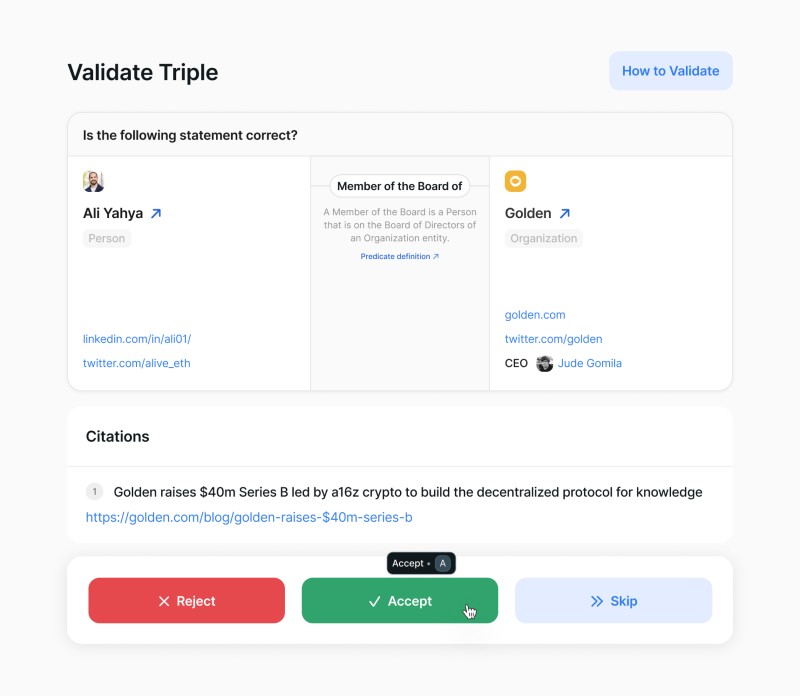A ‘Wikipedia for Web3’ has raised $40 million in a Series B funding round led by a16z (Andreessen Horowitz).
The Golden protocol financially rewards participants for building a decentralised ‘graph of canonical knowledge’, according to the company.
Ali Yahya, a general partner at a16z and crypto investor, will join the board of the startup alongside current board member Marc Andreessen.
Participants in the round include Matt Bellamy (lead singer of Muse and partner of Helium-3 Ventures), Protocol Labs, Raj Gokal (founder of Solana), Dan Romero, OpenSea Ventures, Juan Benet (founder of Protocol Labs), Arash Ferdowsi (co-founder and ex-CTO of Dropbox), Dylan Field (CEO of Figma), Bastian Lehmann (founder of Postmates), Maryanna Saenko (Future Ventures), Michael Seibel (ex-CEO of Y Combinator and co-founder of Twitch), Avlok Kohli (CEO of AngelList), Harpoon Ventures, Amir Moazami, DCVC, Sridhar Ramaswamy (CEO of Neeva), MVP Ventures, Khaled Naim (CEO of Onfleet), HNVR, Vela Partners, Socii Capital, George Lambeth, FalconX, Stefano Bernardi, Wei Guo, Xoogler, TRAC, Scale Asia Ventures, Chaac Ventures and Neal Dempsey.
Jude Gomila, CEO and founder, wrote in a blog post that as knowledge is fragmented, to find reliable information “one needs to search across centralised repositories, personal webpages, news sites, blogs and private databases… the world lacks a standardised interface for discovering, contributing and verifying knowledge”.
“Creating this interface in a scalable way requires not just data; it requires the development of incentives for data entry, verification, and governance,” he continued. “Web3 technologies and mechanics are well suited to solve the core problems of incentivizing efficient task execution and organising resources for protocol operations.”
The said Golden is in a ‘testnet’ phase with 35,000 individuals participating in its Discord community, a live decentralised dApp, APIs and early governance. “They are currently submitting facts, validating information, improving and building the protocol itself,” he said.

The company utilises a mechanism of ‘slashing’ – the removal of staked crypto collateral – in order to provide a downside for providing or validating incorrect data.
It is constructing canonical public data NFTs for each ‘real world’ entity – or subject – in the protocol. This disincentives the production of duplicates, while providing revenue-sharing rights for the data constructors.
The protocol will also develop reputation scores of good submitters and validators over time, ‘reducing the effort required to validate information’.
“This is not simply a ‘Web3 Wikipedia’. We have a chance to make something much greater in terms of enhanced schema around the data, richer predicates, scale in entity count, validated data, transparent and market based governance, a system that can evolve over time, immutability of ledgering our collective knowledge and permissionless knowledge,” said Gomila.
“Having accurate data in a deeply-linked knowledge graph allows for the creation of new applications and insights that are not currently possible. We are eager to see how this resource will be applied, from classic industries to AI research.”
The protocol aims to launch fully in Q2 2023.

